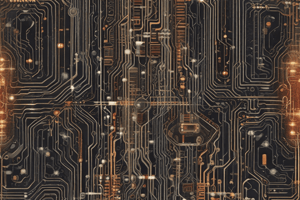Podcast
Questions and Answers
What is the primary function of an electrical circuit?
What is the primary function of an electrical circuit?
- To provide a closed path for electricity to flow (correct)
- To convert electrical energy into chemical energy
- To isolate electrical components from one another
- To store electrical energy for future use
Which of the following correctly describes resistance in an electrical circuit?
Which of the following correctly describes resistance in an electrical circuit?
- It is always constant regardless of temperature
- It opposes the flow of current based on material properties and dimensions (correct)
- It only depends on the length of the conductor
- It increases with higher electrical energy input
What typically occurs in a short circuit?
What typically occurs in a short circuit?
- The current is cut off completely
- The circuit experiences extremely low resistance (correct)
- The electrical supply is halted temporarily
- There is an increase in resistance
What role do batteries/cells play in an electrical circuit?
What role do batteries/cells play in an electrical circuit?
Which statement accurately reflects the role of electrolytes in electrochemical cells?
Which statement accurately reflects the role of electrolytes in electrochemical cells?
Flashcards
Electrical energy conversion
Electrical energy conversion
Process of changing electrical energy into another energy form (like heat or light).
Resistance
Resistance
Opposition to current flow in a material.
Load
Load
Component that uses energy in an electrical circuit.
Short Circuit
Short Circuit
Signup and view all the flashcards
Electrical Circuit
Electrical Circuit
Signup and view all the flashcards
Study Notes
Electrical Energy
- Energy conversion: Charges move into a higher energy state. Electrons lose energy as they are converted into another type of energy.
- Resistance: Loads oppose current flow; collisions between electrons and atoms slow current.
- Factors affecting resistance: Material type, cross-sectional area, length, and temperature. Resistance is measured in ohms (Ω).
- Electrical circuit: A complete path for electricity flow.
- Short circuit: A circuit with very low resistance, high current, and potential fire hazard.
- Battery: A connection of multiple cells.
- Source: Provides electrical energy (e.g., battery).
- Cell: Contains electrolyte in a liquid or moist paste; generates electrical energy from chemical reactions.
- Electrolyte: Liquid or moist paste in a cell.
- Electrochemical cell: A device that produces electrical energy from chemical reactions.
Studying That Suits You
Use AI to generate personalized quizzes and flashcards to suit your learning preferences.




